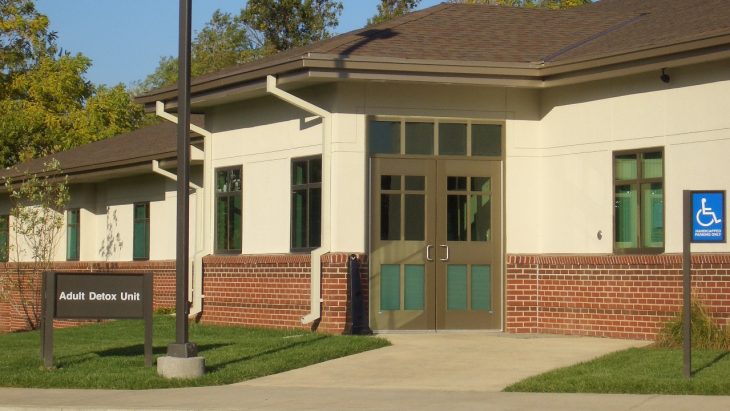Johnson County Mental Health Center Adult Detoxification Unit

About Johnson County Mental Health Center Adult Detoxification Unit
Johnson County Mental Health Center offers substance use disorder (SUD) and co-occurring mental health disorder treatment services, including detoxification. The detox unit is in Shawnee, Kansas. The unit is open 24/7 for monitored detox, though this is not a medically supervised detox.
In the event of a medical problem, you’ll be referred to nearby treatment. Services are for clients 18 and older. The county will file with your insurance company on your behalf.
They accept most insurance, including Kansas Medicaid and AAPS funding. Depending on the circumstances, the Kansas Department of Corrections may pay for your treatment. The county buildings are handicapped accessible.
Adolescent Center for Treatment in Johnson County
In addition to adult detox, the county has a residential facility for adolescents with drug or alcohol related problems. This is an 11 bed facility that’s staffed by licensed clinicians 24/7. This inpatient facility is a safe space for teens to begin their substance use and mental health recovery.
The program uses individualized treatment plans for clients from 12-18 years of age. To be eligible, a psychiatric assessment must specify the need for inpatient treatment. Clients must be free from serious mental illness or major medical disorders.
Additional Johnson County Services
Johnson County has the highest population of any county in Kansas. The county features several prominent cities that are suburbs of Kansas City. The county is home to many parks, attractions and cultural opportunities.
County services reach far beyond treatment for SUD and co-occurring mental health disorders. They offer aging and human services, caregiver support and counseling, as well as meal programs for seniors.
They provide domestic court services, child care licensing and children’s parks and recreation services. The county’s HOME program helps eligible county homeowners with the rehab needs of their homes, as long as they’re owner occupied. These are a few of the many services offered by the county.
| Levels of Care | Detox Service Setting | Programs | Payment Options | |||
|---|---|---|---|---|---|---|
|
Inpatient and residential programs provide round-the-clock medical and emotional support as you live at the treatment facility. This level of care may be recommended if you have severe addictions or mental health conditions since it removes outside distractions and allows you to focus solely on therapy. |
Aftercare programs provide ongoing support after you complete a rehab program. They may include several components to help you maintain sobriety including therapy, community support groups and relapse prevention strategies. This gives you a network of resources as you reintegrate into your daily life. |
|||||
|
Inpatient detox occurs in a dedicated treatment facility. You’ll live there around the clock and receive intensive medical support and supervision to help manage your withdrawal symptoms. It is suitable for individuals with moderate to severe addictions as it ensures a stable detox environment. |
||||||
|
Adult programs address the substance use and life challenges specific to adults. Therapists can deliver sessions in individual, group and family settings. Services often include job support and life skills training in a structured environment. |
Alcohol detox programs offer medical support to help individuals withdraw safely from alcohol. Your care team may use medications to ease your symptoms and provide medical monitoring to address complications. |
Drug detox programs support individuals who are withdrawing from addictive substances like cocaine and heroin. Medical support helps you manage symptoms in a controlled and safe environment so you can achieve initial sobriety. |
Men's programs address substance use while also considering the social pressures, family roles and mental health concerns that are specific to men. You’ll learn healthy coping mechanisms as you build emotional resilience and develop communication skills. |
Opioid detox uses medications to ease severe withdrawal symptoms. It also includes medical supervision to help you manage potential complications. These services allow you to stabilize and begin a recovery plan. |
Women's programs offer a safe and supportive space to focus on gender specific issues such as trauma, family roles and mental health conditions. Therapists tailor the sessions to address women's needs and foster empowerment in a healing and nurturing environment. |
Young adult programs are designed for individuals who are transitioning into adulthood. Topics of discussion typically include identity, independence and peer relationships. Providers may also offer life skills training and career support. |
|
Free
|
Levels of Care
Inpatient and residential programs provide round-the-clock medical and emotional support as you live at the treatment facility. This level of care may be recommended if you have severe addictions or mental health conditions since it removes outside distractions and allows you to focus solely on therapy.
Aftercare programs provide ongoing support after you complete a rehab program. They may include several components to help you maintain sobriety including therapy, community support groups and relapse prevention strategies. This gives you a network of resources as you reintegrate into your daily life.
Detox Service Setting
Inpatient detox occurs in a dedicated treatment facility. You’ll live there around the clock and receive intensive medical support and supervision to help manage your withdrawal symptoms. It is suitable for individuals with moderate to severe addictions as it ensures a stable detox environment.
Programs
Adult programs address the substance use and life challenges specific to adults. Therapists can deliver sessions in individual, group and family settings. Services often include job support and life skills training in a structured environment.
Alcohol detox programs offer medical support to help individuals withdraw safely from alcohol. Your care team may use medications to ease your symptoms and provide medical monitoring to address complications.
Drug detox programs support individuals who are withdrawing from addictive substances like cocaine and heroin. Medical support helps you manage symptoms in a controlled and safe environment so you can achieve initial sobriety.
Men's programs address substance use while also considering the social pressures, family roles and mental health concerns that are specific to men. You’ll learn healthy coping mechanisms as you build emotional resilience and develop communication skills.
Opioid detox uses medications to ease severe withdrawal symptoms. It also includes medical supervision to help you manage potential complications. These services allow you to stabilize and begin a recovery plan.
Women's programs offer a safe and supportive space to focus on gender specific issues such as trauma, family roles and mental health conditions. Therapists tailor the sessions to address women's needs and foster empowerment in a healing and nurturing environment.
Young adult programs are designed for individuals who are transitioning into adulthood. Topics of discussion typically include identity, independence and peer relationships. Providers may also offer life skills training and career support.




